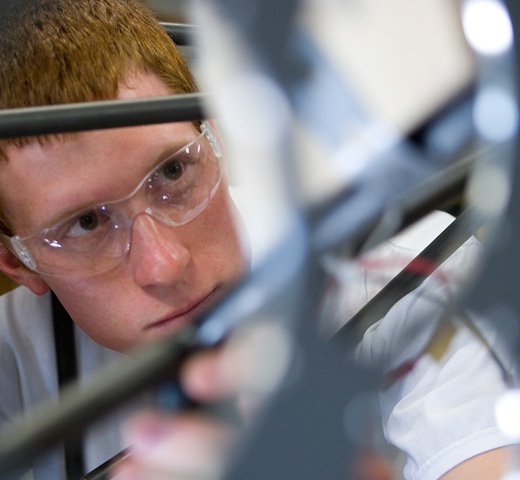
Engineering
- M
Are you interested in a degree that develops technology to advance the health care industry? As a biomedical engineering major at a Christian university, you will learn how to apply mechanical and electrical engineering principles to health solutions, including work in medical assistive technology and medical equipment.
With the ABET-accredited Bachelor of Science in Biomedical Engineering (BSBME), also known as bioengineering, from Messiah University, one of the top private Christian universities in the U.S., you will gain the ability to understand the framework of complex issues that require solutions involving biomedical engineering principles. Being part of one of the few Christian biomedical engineering major programs, you will consider the application of technology as it relates to the medical industry and the human body. Using engineering design and problem-solving skills, you’ll help advance the state of health care diagnosis, treatment and recovery.
Explore All Engineering Programs
As a biomedical engineering major or minor at Messiah University, you'll be able to:
As a graduate of the biomedical engineering program, you will be equipped to secure positions such as:
Our program takes very seriously our role in helping you with career preparation and your career search.
For more information on career planning for the engineering program, visit the Messiah University Career and Professional Development Center.
Most students pursue a summer internship in their area of interest during their time in our program, and Messiah's nationally recognized internship program is happy to help. Students have recently interned with companies such as:
The Biomedical Engineering (BS) program is accredited by the Engineering Accreditation Commission of ABET, under the commission’s General Criteria and Program Criteria for Biomedical Engineering.
By studying biomedical engineering, you’ll learn to engage problems in their broad context while developing process, design, teamwork, leadership, project management and planning skills. You will be challenged with a balance of technical training, broad education and Christian faith formation, and you will apply your knowledge to service projects in real, tangible ways. You will enter a leading-edge industry influencing the health and well-being of lives everywhere. Learn more about why Messiah's engineering program is different than other programs and how the Collaboratory helps prepare you for a successful career with these FAQ videos.
Messiah University's test-optional policy enables first-year students to receive admission, secure scholarships and compete for the Messiah University Honors Program without submitting standardized tests.
Learn more when you check out our Test Optional Policy FAQ.
In the Biomedical Engineering program, you will take a selection of courses that successfully prepare you for a career in a related field. Hands-on experiences and classroom learning within the framework of Christian faith will give you the skills and knowledge to achieve your goals. Our programs offer a wide variety of courses that will not only help you excel in your future career, but challenge you to develop a deeper understanding of your field of study.
Graduates of this program work in positions of leadership in their places of employment, using the tools and knowledge a Messiah University education prepared them with. Each year, eager employers and some of the nation's best graduate schools welcome Messiah graduates into their organizations.
95% of the Class of 2024 respondents were employed or in graduate school within 6-9 months of graduation.
Regional and national employers seek out Messiah graduates for their academic preparation, work ethic and personal character. The transformation you experience at Messiah readies you to transform the lives of others through your chosen career path.
Learning in the classroom is important but actually applying that knowledge in a hands-on way can make all the difference. At Messiah University, the Experiential Learning Initiative (ELI) allows Messiah to take this hands-on learning to a new level by giving students the opportunity to apply what they have learned to various real world contexts--such as an internship/practica, service learning, off-campus program, holding a student leadership position, or participating in undergraduate research.
Starting your second year, you’ll work on projects that meet the needs of a real-world client in a Christian missions context. You will be offered the opportunity to begin using your engineering skills right away, not only in Pennsylvania, but around the world. When you finish your degree, you’ll walk into your first job with a complete project management and technical application experience.
Participate in the Integrated Projects Curriculum (IPC) in partnership with the Collaboratory, which provides all engineering students with a five-semester sequence of credit-bearing opportunities to use what you learn in the classroom to solve authentic problems for local and international clients such as building prosthetics, wheelchairs and more. Don't want to wait until sophomore year? You can start volunteering in the Collaboratory as a first-year student!
In addition, you’ll get to use our specialized facilities, including a professionally staffed machine shop; state-of-the-art mechanical, electrical, environmental and biomedical engineering labs; industry-standard engineering software, in-house circuit prototyping equipment and a robotics lab.
To meet the engineering degree requirements, you’ll take 15 pre-engineering courses and eight upper-level engineering courses. Then, you’ll finish the degree with nine courses in the biomedical, civil, computer, electrical, environmental or mechanical concentrations.
Continually recognized as a top engineering degree program by U.S. News and World Report, our engineering courses provide a balance of technical knowledge, broad education and Christian faith, in addition to you getting the opportunity to apply your knowledge to service projects in real, tangible ways through the University’s unique Integrated Projects Curriculum (IPC).
Last updated: